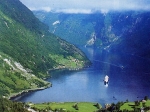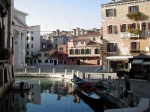
 Cyprus is an island in the eastern Mediterranean Sea , 113 kilometres (70 miles) south of Turkey and around 120 km west of the Syrian coast.
Cyprus is an island in the eastern Mediterranean Sea , 113 kilometres (70 miles) south of Turkey and around 120 km west of the Syrian coast.
Geography
The central plain (Mesaoria) with the Kyrenia/Girne and Pentadactylos/Besparnak mountains to the north and the Troodos mountain range to the south and west. There are also scattered but significant plains along the southern coast.
The climate is temperate, Mediterranean with hot, dry summers and cool, variably rainy winters.
Politics
After independence Cyprus became a founding member of the Non-Aligned Movement despite all three guarantor powers ( Greece , Turkey and the UK ) being NATO members. Cyprus left the Non-Aligned Movement in 2004 to join the EU .
Since 1974, Cyprus has been divided de facto into the government-controlled southern two-thirds of the island and the Turkish-Cypriot northern one-third. The Government of the Republic of Cyprus has continued as the internationally recognised authority; in practice, its power extends only to the Greek Cypriot-controlled areas.
The 1960 Cypriot Constitution provided for a presidential system of government with independent executive, legislative, and judicial branches, as well as a complex system of checks and balances, including a weighted power-sharing ratio designed to protect the interests of the Turkish Cypriots. The executive, for example, was headed by a Greek Cypriot president and a Turkish Cypriot vice president, elected by their respective communities for 5-year terms and each possessing a right of veto over certain types of legislation and executive decisions.
The House of Representatives was elected on the basis of separate voters' rolls. Since 1964, following clashes between the two communities the Turkish seats in the House have been vacant and the Greek Cypriot Communal Chamber was abolished. The responsibilities of the chamber were transferred to the newfounded Ministry of Education.
In 1974, following a coup intrigued by CIA and executed by the Greek Junta - then in control of the National Guard and the military invasion of Turkish forces (claiming their authority was as one of the 3 international guarantors of Cyprus), 195,000 majority Greek Cypriots were forcibly expelled from the north and 55,000 Turkish Cypriots from the south were moved to north. Ever since, Turkish Cypriots unilaterally set up their own institutions with a popularly elected president and a Prime Minister responsible to the National Assembly exercising joint executive powers. In 1983, the Turkish Cypriots declared an independent "Turkish Republic of Northern Cyprus" (TRNC,) contrary to numerous UN SC resolutions calling such an act as illegal and a by-product of a foreign (Turkish) intervention. In 1985, they adopted a constitution and held elections – an arrangement recognised only by Turkey.
Economy
Economic affairs in Cyprus are dominated by the division of the country into the southern (Greek) area controlled by the Cyprus Government and the northern Turkish Cypriot-administered area.
The Greek Cypriot economy is prosperous but highly susceptible to external shocks. Erratic growth rates in the 1990s reflect the economy's vulnerability to swings in tourist arrivals, caused by political instability on the island and fluctuations in economic conditions in Western Europe. Economic policy in the south is focused on meeting the criteria for admission to the European Union. As in the Turkish sector, water shortage is a growing problem, and several desalination plants are planned.
The Turkish Cypriot economy has about one-fifth the population and one-third the per capita GDP of the south. Because it is recognised only by Turkey, it has had much difficulty arranging foreign financing, and foreign firms have hesitated to invest there. The economy remains heavily dependent on agriculture and government service, which together employ about half of the work force. Moreover, the small, vulnerable economy has suffered because the Turkish lira is legal tender. To compensate for the economy's weakness, Turkey provides direct and indirect aid to tourism, education, industry, etc.
Demographics
Greek and Turkish Cypriots share many customs but maintain distinct identities based on religion, language, and close ties with their respective motherlands.
Greek language is predominantly spoken in the south, Turkish language in the north. This delineation of languages is true only in the present period, due to the post-1974 division of the island, which involved an expulsion of Greek Cypriots from the north and the analoguous move of Turkish Cypriots from the south. Historically however, Greek (its Cypriot dialect ) was spoken by nearly 82% of the population, which was evenly distributed along the entire area of Cyprus, north and south. Similarly, Turkish speakers were evenly distributed. English is widely used.
Cyprus has a well-developed system of primary and secondary education. The majority of Cypriots earn their higher education at Greek, Turkish, British, or American universities, while there are also sizeable emigrant communities in the United Kingdom and Australia. Private colleges and state-supported universities have been developed by both the Turkish and Greek communities.




